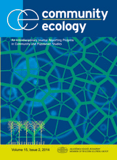
COMMUNITY ECOLOGY
Scope & Guideline
Advancing Understanding of Community Dynamics
Introduction
Aims and Scopes
- Community Structure and Dynamics:
Research on how species interactions, such as predation, competition, and mutualism, influence community composition and stability. - Biodiversity Assessment and Conservation:
Studies that evaluate biodiversity patterns and the effectiveness of conservation strategies in different habitats, particularly in response to human impacts. - Functional Ecology:
Exploration of functional traits and their implications for ecosystem processes and services, focusing on how species traits influence community dynamics. - Spatial and Temporal Patterns:
Analysis of how ecological communities change over time and space, incorporating landscape ecology and biogeography to understand distribution patterns. - Impact of Environmental Changes:
Investigating the effects of climate change, land use, and invasive species on community composition and ecosystem resilience.
Trending and Emerging
- Microbial Community Dynamics:
An increasing focus on microbial communities highlights their essential roles in ecosystem functioning, nutrient cycling, and responses to environmental changes. - Urban Ecology and Human Impacts:
Research addressing the effects of urbanization on ecological communities is on the rise, reflecting a growing interest in understanding how human activities influence biodiversity and ecosystem services. - Functional Traits and Ecosystem Services:
There is a notable trend towards studying functional traits in relation to ecosystem services, emphasizing how species contribute to ecological functions and overall community resilience. - Citizen Science and Data Integration:
The use of citizen science and large-scale data integration for biodiversity monitoring and community assessment is emerging as a valuable approach, facilitating broader engagement and data collection. - Climate Change and Community Resilience:
Research examining the impacts of climate change on community dynamics and the resilience of ecosystems is gaining prominence, highlighting the urgent need to understand adaptive capacities in a changing world.
Declining or Waning
- Traditional Taxonomic Studies:
There appears to be a waning interest in purely taxonomic studies that do not integrate ecological or functional perspectives, as the field increasingly values functional diversity and ecological interactions. - Focus on Single Species Studies:
Research centered solely on single species, without considering community-level interactions, is becoming less frequent, as the journal emphasizes multi-species interactions and community-level dynamics. - Static Biodiversity Metrics:
There is a declining trend in the publication of studies that rely solely on static measures of biodiversity (e.g., species richness) without exploring dynamic processes or ecological functions.
Similar Journals

BIOTA NEOTROPICA
Connecting Scientists to Unravel Nature's MysteriesBIOTA NEOTROPICA is a prominent open access journal dedicated to advancing knowledge in the interdisciplinary field of ecology, evolution, behavior, and systematics. Published by REVISTA BIOTA NEOTROPICA since 2001, this Brazilian journal aims to provide a platform for high-quality research that fosters a deeper understanding of Neotropical biodiversity and its conservation. With an ISSN of 1676-0603 and an E-ISSN of 1676-0611, the journal has established its reputation within academic circles, ranking in the Q3 quartile for Ecology and achieving a respectable percentile of 57 in Scopus’s metrics. Operating from its headquarters in Campinas, SP, Brazil, BIOTA NEOTROPICA not only focuses on research dissemination but also encourages collaboration and exchange of ideas among scientists, students, and professionals in the field. The journal is particularly valuable for those looking to contribute to the understanding of ecological systems and promotes accessibility with its open access model.

Neotropical Biodiversity
Advancing knowledge for a thriving Neotropical future.Neotropical Biodiversity is a prominent journal dedicated to advancing our understanding of biodiversity and ecological dynamics within the Neotropical region. Published by TAYLOR & FRANCIS LTD in the United Kingdom, this Open Access journal has been providing unrestricted access to research findings since 2015, fostering collaboration and knowledge sharing among the global scientific community. With an emphasis on innovative research in Ecology, Ecology, Evolution, Behavior and Systematics, and Global and Planetary Change, it has earned a reputation for excellence, currently holding a Q3 category in its field. As of 2023, the journal ranks in the 37th percentile for Environmental Science (Ecology) and in the 36th percentile for Agricultural and Biological Sciences (Ecology, Evolution, Behavior and Systematics), making it a valuable resource for researchers, professionals, and students interested in understanding and preserving biodiversity in one of the world's most diverse ecosystems. We invite you to explore the cutting-edge research published in Neotropical Biodiversity and contribute to the ongoing dialogue for environmental sustainability and ecological resilience.
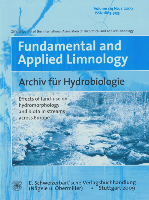
Fundamental and Applied Limnology
Navigating Freshwater Science: From Fundamental Studies to Practical SolutionsFundamental and Applied Limnology is an esteemed academic journal dedicated to the exploration of freshwater ecosystems, bridging the gap between fundamental research and practical applications. Published by E Schweizerbart'sche Verlagsbuchhandlung in Germany, this journal has been a vital resource in the fields of aquatic science and ecology since its inception in 2007. With its ISSN 1863-9135 and E-ISSN 1863-9135, it provides a platform for researchers to disseminate significant findings related to limnology, contributing to a rich understanding of freshwater biodiversity, water quality, and ecological interactions. Although currently rated in the Q3 quartile for aquatic sciences and ecology as per the 2023 rankings, it remains a valuable outlet for interdisciplinary research and practical insights, facilitating critical advancements in environmental management. Open access options enhance its visibility and accessibility, making it indispensable for researchers, professionals, and students alike who are committed to advancing the scholarship in freshwater studies. Engaging with this journal not only opens doors to the latest research findings but also fosters collaboration and innovation in the ecological community.

ECOLOGY LETTERS
Bridging theory and practice in the world of ecology.ECOLOGY LETTERS, published by Wiley, is a premier journal dedicated to advancing the field of ecology and related disciplines. Renowned for its rigorous peer-review process and impactful research contributions, the journal boasts an impressive Scopus Rank of #13 out of 721 in the category of Agricultural and Biological Sciences, positioning it in the 98th percentile globally. With a Q1 rating in the 2023 quartile rankings for Ecology, Evolution, Behavior and Systematics, it serves as an essential platform for ecologists and evolutionary biologists to disseminate cutting-edge research findings from 1998 to 2024. Although not an open-access journal, ECOLOGY LETTERS actively contributes to the global ecology discourse, making it a critical resource for researchers, professionals, and students dedicated to understanding complex ecological interactions and evolutionary processes.

ACTA OECOLOGICA-INTERNATIONAL JOURNAL OF ECOLOGY
Illuminating Pathways to Sustainable SolutionsACTA OECOLOGICA-INTERNATIONAL JOURNAL OF ECOLOGY, published by Elsevier, stands as a prominent platform for disseminating innovative research in the diverse field of ecology. Operating since 1983 and continuing to make significant contributions into 2024, this journal features critical studies that advance our understanding of ecological systems, behaviors, and conservation efforts. With an impressive Q2 ranking in both the ecology and nature conservation categories, it exemplifies high-quality scholarship, reflected in its Scopus rankings—#74 in Environmental Science and #254 in Agricultural and Biological Sciences. Researchers, professionals, and students in the field are invited to explore the latest findings and methodologies that address pivotal ecological issues. As a journal committed to fostering academic collaboration, ACTA OECOLOGICA is essential for anyone dedicated to enhancing their comprehension of ecological dynamics and advancing sustainability practices globally.

Nature Conservation Research
Exploring the intersection of science and environmental stewardship.Nature Conservation Research is a prominent open-access journal that has been dedicated to advancing the field of conservation science since its inception in 2016. Published by the SARANSK FOND PODDERZKI & RAZVITIA ZAPOVEDNYH in the Russian Federation, this journal serves as a vital platform for researchers, professionals, and students alike, providing critical insights into ecological and environmental issues. With an impressive impact factor and ranked in the second quartile across multiple categories—including Agricultural and Biological Sciences, Earth and Planetary Sciences, Ecology, and Nature and Landscape Conservation—Nature Conservation Research stands at the forefront of impactful scientific discourse. The journal not only aims to disseminate high-quality research findings but also seeks to foster collaboration and innovation in conservation practices globally. By ensuring open access to its content, it promotes widespread dissemination of knowledge, crucial in the fight against biodiversity loss and environmental degradation. Researchers and practitioners contributing to the journal will find themselves at the convergence of science and conservation efforts, paving the way for sustainable ecosystem management.
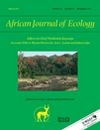
AFRICAN JOURNAL OF ECOLOGY
Driving Innovation in Ecology and SystematicsThe African Journal of Ecology, published by Wiley, is a leading academic journal in the field of Ecology, Evolution, Behavior, and Systematics. Established in 1963 and continuing its vital contributions to the field until 2024, this journal serves as a premier platform for researchers and scholars to share groundbreaking studies that explore the intricate relationships within ecosystems, particularly in the African context. With an impressive Scopus Rank of #423 out of 721 and a Q3 Quartile ranking, it stands as a credible source of scholarly information, gaining recognition among peers for its rigorous peer-review process and impactful publications. While the journal is not open access, it remains influential in driving advancements in ecological research and providing insights vital for conservation efforts and biodiversity studies. Authors and readers alike will find that the African Journal of Ecology not only promotes scientific inquiry but also fosters a deeper understanding of ecological dynamics that affect our world.
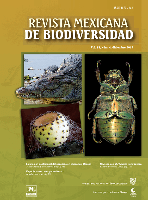
Revista Mexicana de Biodiversidad
Championing Conservation through Innovative ResearchRevista Mexicana de Biodiversidad is a prominent academic journal dedicated to the field of biodiversity and conservation, published by the prestigious Instituto de Biología, Universidad Nacional Autónoma de México. Since its inception as an Open Access publication in 2005, it has aimed to disseminate high-quality research that advances the understanding of biological diversity in Mexico and beyond. With an ISSN of 1870-3453 and an E-ISSN of 2007-8706, the journal caters to a diverse audience, including researchers, professionals, and students, by providing vital insights into ecological studies, conservation strategies, and the sustainable management of natural resources. The journal is committed to fostering scientific collaboration and promoting the significance of biodiversity in addressing contemporary environmental challenges. By publishing innovative and impactful research, the Revista Mexicana de Biodiversidad plays an essential role in the global discourse on biodiversity conservation.

ECOGRAPHY
Exploring the Dynamics of Nature and EvolutionECOGRAPHY, published by WILEY, stands at the forefront of ecological and evolutionary research, with an impressive Impact Factor reflecting its esteemed position in the Q1 category of Ecology, Evolution, Behavior, and Systematics. Operating since 1978 and transitioning to a fully Open Access model in 2020, the journal is dedicated to disseminating high-quality research that influences conservation practices and enhances our understanding of ecological dynamics. With an ISSN of 0906-7590 and an E-ISSN of 1600-0587, ECOGRAPHY has garnered a remarkable placement in Scopus rankings, being in the top 4% of its category, achieving an impressive rank of #27 out of 721 in Agricultural and Biological Sciences. Academics from around the globe benefit from the research published in this journal, which seeks to engage and inspire further exploration of ecological systems. For inquiries, ECOGRAPHY can be reached at their UK address: 111 River St, Hoboken 07030-5774, NJ.
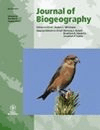
JOURNAL OF BIOGEOGRAPHY
Charting New Territories in Biogeography and EcologyJOURNAL OF BIOGEOGRAPHY, published by Wiley, stands as a premier multidisciplinary platform for the publication of high-quality research in the fields of biogeography and ecology. With an impressive Q1 ranking in both Ecology and Ecology, Evolution, Behavior and Systematics categories for 2023, this journal is recognized for its significant contribution to understanding ecological patterns and processes across geographic spaces. The journal, which has been in circulation since 1948 with a continuous production from 1979 to 2024, features rigorously peer-reviewed articles, critical reviews, and essential data that illuminate the dynamic interactions between organisms and their environments. While this journal does not currently offer open access options, it remains a valuable resource for researchers, professionals, and students seeking to explore the latest discoveries and theoretical advances in biogeography. With impressive Scopus rankings, including a 73rd position out of 721 in Agricultural and Biological Sciences and a 53rd position out of 461 in Environmental Science, the JOURNAL OF BIOGEOGRAPHY is indispensable for those aiming to advance their understanding of ecological frameworks and biodiversity conservation.